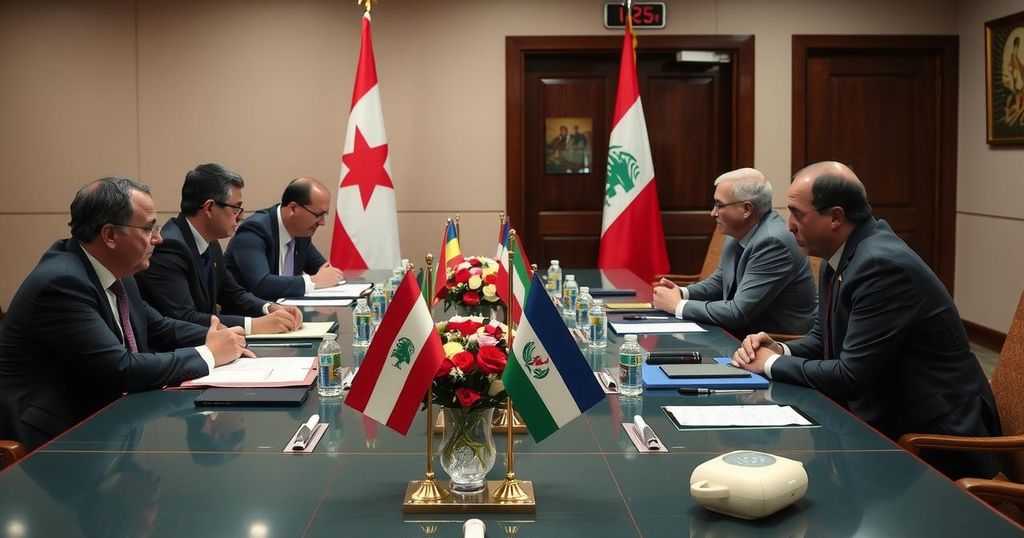Ambassador El-Khoury on Lebanon’s Future: Stability Linked to Syria’s Recovery

Ambassador Ghady El-Khoury expressed optimism regarding the recent election of General Joseph Aoun as President of Lebanon and its potential to usher in stability after a prolonged political crisis. He highlighted the importance of improving relations with Syria following its regime change and emphasized that a stable Syria is crucial for Lebanon’s recovery. The ambassador indicated that overcoming internal challenges requires comprehensive efforts and support from the international community, particularly the Holy See.
Ambassador Ghady El-Khoury, Lebanon’s newly appointed envoy to the Holy See, recently spoke with Vatican News regarding the political landscape in Lebanon following the election of General Joseph Aoun as President. This pivotal election, viewed as a break from previous stagnation, brings hope for Lebanon’s future, particularly as it coincides with changes in Syria’s regime. General Aoun’s election on January 9 marked the end of a prolonged institutional crisis and reflects the aspirations of many Lebanese for stability amidst ongoing geopolitical tensions in the region.
Ambassador El-Khoury expressed optimism for Lebanon’s recovery, citing the importance of both national and regional dynamics. Aoun’s election follows intense backing from Saudi Arabia and the United States, and he aims to consolidate power and address internal challenges, including managing arms and focusing on national security against external threats, particularly from Israel. The ambassador highlighted Aoun’s potential to forge a new phase in Lebanese politics, indicating that his leadership could unify various factions within the country.
The ambassador noted that the establishment of stronger ties with Syria is essential following the regime change in Damascus. On January 11, Prime Minister Najib Mikati visited Syria, marking a significant diplomatic step and renewed cooperation on border security. This reflects a strategic shift in Lebanese policy and illustrates a broader ambition for political collaboration between the two nations, contingent on Syria achieving stability.
Mr. El-Khoury underscored the importance of a peaceful and democratic Syria for Lebanon’s recovery, emphasizing shared economic and political interests. He expressed confidence that such regional stability would allow Lebanon to focus on urgent socio-economic challenges, which include tackling a humanitarian crisis and initiating reconstruction projects, particularly in war-affected areas. Furthermore, he acknowledged the extensive work required to revitalize Lebanon after years of stagnation and mismanagement.
In summary, the ambassador firmly believes that the recent electoral developments could foster a brighter future for Lebanon, enhancing both Christian and Muslim coexistence in the region. His positive outlook is reinforced by the commitment of international partners, especially the Vatican, to support Lebanon in this critical transition.
The situation in Lebanon has been characterized by prolonged political instability, a crippling economic crisis, and ongoing external threats, particularly from Israel and Iran-aligned groups. The recent election of General Joseph Aoun as President signifies a potential turning point in Lebanese governance, marking an end to 26 months of political vacuum and institutional paralysis. Following the election of Aoun, Ambassador El-Khoury’s insights reflect broader hopes for revitalization in a country historically marked by sectarian divisions and conflicts. Furthermore, shifts in Syria’s political landscape following the ousting of Bashar al-Assad’s regime present unique opportunities for Lebanon to stabilize and revamp its foreign relations. Given the intertwined histories, political realities, and socio-economic challenges facing both nations, ensuring regional stability is critical for encouraging recovery efforts and addressing internal strife. With a multi-national approach and support from the international community, the prospects for Lebanon’s systemic reform appear more promising than they have in recent years.
In conclusion, the election of Joseph Aoun as President of Lebanon brings renewed hope for political stability and recovery amidst a backdrop of complex challenges. Ambassador El-Khoury’s optimistic portrayal of the new leadership’s potential to foster national unity and improved relations with Syria underscores the critical need for regional stability. The ambassador’s call for a comprehensive recovery agenda reflects the pressing socio-economic issues Lebanon faces, while the international support, especially from the Vatican, remains pivotal for facilitating necessary reforms and ensuring lasting peace. The focus must remain on consolidating power, addressing security concerns, and fostering inter-religious harmony, which are all essential elements for a prosperous future for Lebanon. The outcome of these efforts may significantly influence the broader Middle East, given the interlinked destinies of Lebanon and Syria.
Original Source: www.vaticannews.va






